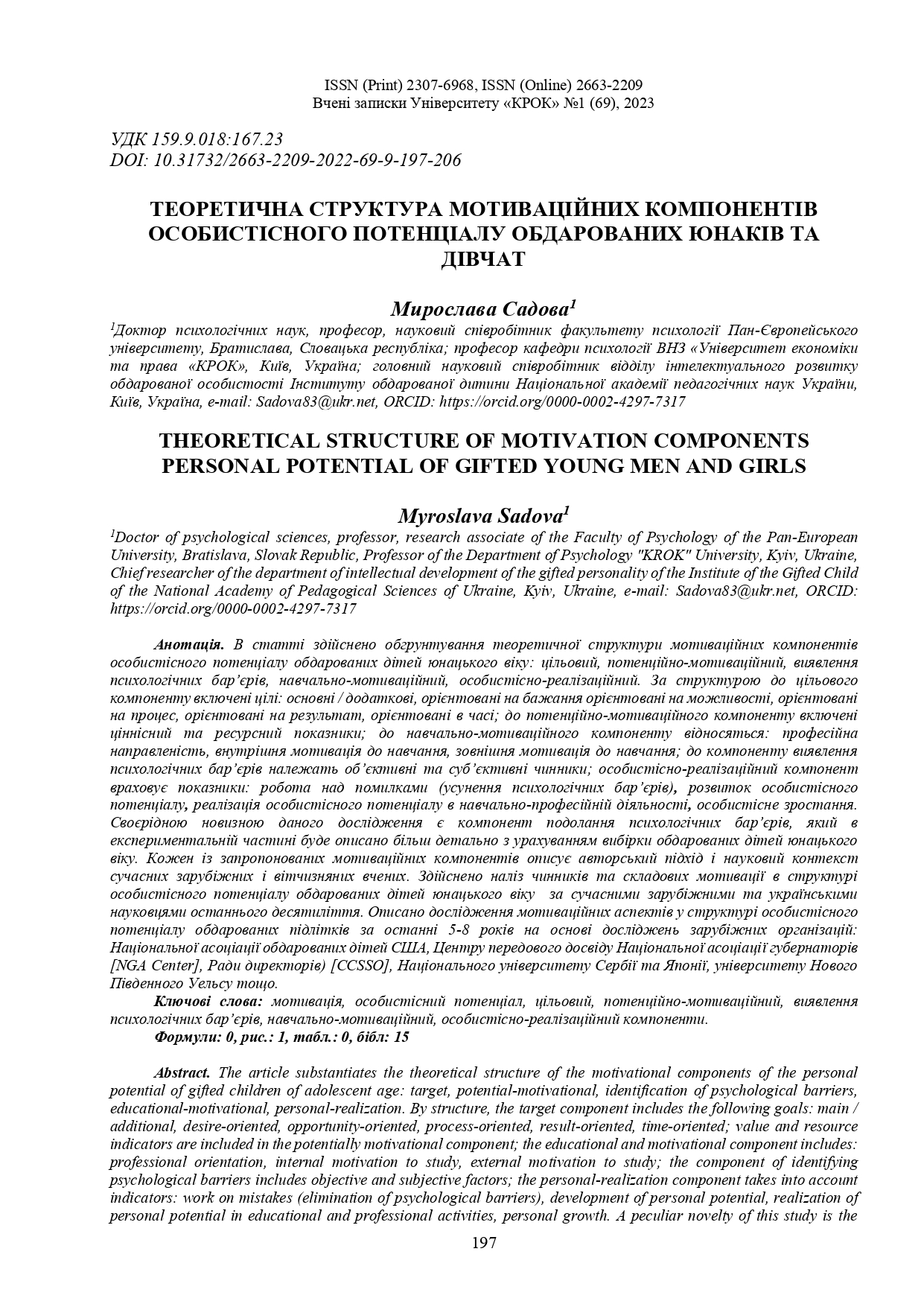THEORETICAL STRUCTURE OF MOTIVATION COMPONENTS PERSONAL POTENTIAL OF GIFTED YOUNG MEN AND GIRLS
DOI:
https://doi.org/10.31732/2663-2209-2022-69-9-197-206Keywords:
motivation, personal potential, target, potential-motivational, identification of psychological barriers, educational-motivational, personal-realization componentsAbstract
The article substantiates the theoretical structure of the motivational components of the personal potential of gifted children of adolescent age: target, potential-motivational, identification of psychological barriers, educational-motivational, personal-realization. By structure, the target component includes the following goals: main / additional, desire-oriented, opportunity-oriented, process-oriented, result-oriented, time-oriented; value and resource indicators are included in the potentially motivational component; the educational and motivational component includes: professional orientation, internal motivation to study, external motivation to study; the component of identifying psychological barriers includes objective and subjective factors; the personal-realization component takes into account indicators: work on mistakes (elimination of psychological barriers), development of personal potential, realization of personal potential in educational and professional activities, personal growth. A peculiar novelty of this study is the component of overcoming psychological barriers, which will be described in more detail in the experimental part, taking into account the sample of gifted children of adolescent age. Each of the proposed motivational components describes the author's approach and the scientific context of modern foreign and domestic scientists. An analysis of the factors and components of motivation in the structure of the personal potential of gifted children of adolescent age was carried out according to modern foreign and Ukrainian scientists of the last decade. The study of motivational aspects in the structure of the personal potential of gifted adolescents over the past 5-8 years is described on the basis of research by foreign organizations: the National Association of Gifted Children of the USA, the Center of Excellence of the National Association of Governors [NGA Center], the Board of Directors) [CCSSO], National Universities of Serbia and of Japan, University of New South Wales, etc.).], Board of Directors) [CCSSO], National Universities of Serbia and Japan, University of New South Wales, etc.
Downloads
References
Садова М. А. Психологічні складові потенціалу самореалізації особистості: дис. ... канд. психол. наук : 19.00.01. Волин. нац. ун-т ім. Лесі Українки. Луцьк, 2015. 198 с.
Erin Dower. Challenges Facing Gifted Children (and How You Can Help!). URL: https://www.familyeducation.com/school/coping-giftedness/9-challenges-facing-gifted-children-how-you-can-help (application date: 04/10/2020).
Danuta Chessor.The Impact of Grouping Gifted Students on Motivation. EjSBS - The European Journal of Social & Behavioural Sciences. URL: https://www.europeanpublisher.com/en/article/10.15405/ejsbs.117 (application date: 01/12/2014).
Lisa Conrad. Personal Goal Setting and Self-Regulation for Gifted Children. URL: https://globalgtchatpoweredbytagt.wordpress.com/2019/03/11/personal-goal-setting-and-self-regulation-for-gifted-children/ (application date: 01/10/2022).
Mazuryk V.M. Osoblyvosti tsilepokladannia osobystosti pry proektuvanni zhyttievoho shliakhu. Science and Education a New Dimension. Pedagogy and Psychology, VI (66), Issue: 162, Maj. URL: https://journals.indexcopernicus.com/api/file/viewByFileId/522124.pdf. (application date: 09/11/2018).
Larry Ferlazzo. Increasing Motivation Through Students Setting Goals. URL: https://www.teachingenglish.org.uk/blogs/larry-ferlazzo/larry-ferlazzo-increasing-motivation-through-students-setting-goals. (application date: 11/08/2015).
Resursnaia kontseptsyia S. Khobfolla.. URL: https://studwood.net/2517070/psihologiya/resursnaya_kontseptsiya_hobfolla. (application date: 03/11/2019).
Sandra Laujin. Psychotherapist, Psychologist, Neuropsychologist in Hong Kong. URL: https://sandralaujin.com/gifted-child?lang=en (application date: 12/12/2021).
Штепа О.С. Визначення психологічних ресурсів особистості. URL: https://filos.lnu.edu.ua/wp-content/uploads/2020/03/Vyznachennia-psykholohichnykh-resursiv-prezentatsiia.pdf (дата звернення: 15.11.2018).
Seligman M.E. Authentic Happiness: Using the New Positive Psychology to Realize Your Potential for Lasting Fulfillment. N.Y.: Free Press, 2019.
Weihua Fan and Cathy Williams. The Mediating Role of Student Motivation in the Linking of Perceived School Climate and Achievement in Reading and Mathematics. URL: https://www.frontiersin.org/articles/10.3389/feduc.2018.00050/full (application date: 04/10/2020).
Водоп’янова Н.Е. Сучасні концепції суб’єкта професійної діяльності. URL: http://surl.li/gcdnm (дата звернення: 3.12.2015).
Степанова В. STEM-освіта. URL: https://imzo.gov.ua/stem-osvita/ (дата звернення: 11.01.2022).
Поліхун Н. Теоретичний аспект STREAM освіти. URL: http://pimenovakatyalpk.blogspot.com/p/blog-page_30.html (дата звернення: 2.06.2022).
Казано П. Методика CLIL: вивчаємо англійську невимушено URL: https://naurok.com.ua/post/metodika-clil-vivchaemo-angliysku-nevimusheno (дата звернення: 10.04.2021).

Downloads
Published
How to Cite
Issue
Section
License

This work is licensed under a Creative Commons Attribution-NonCommercial 4.0 International License.

